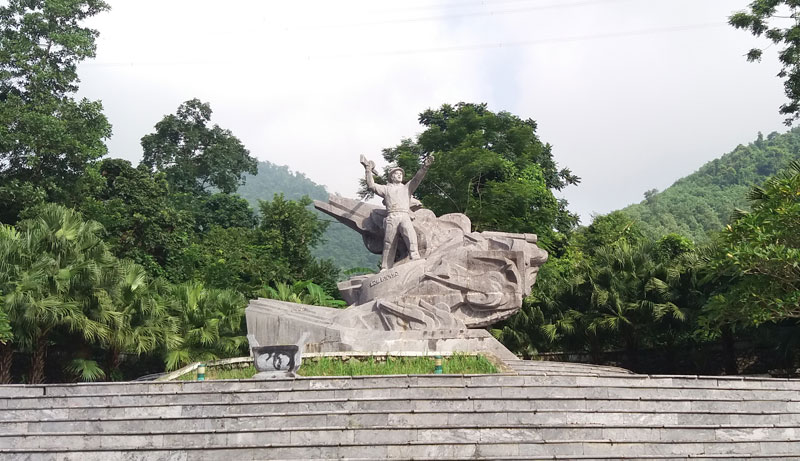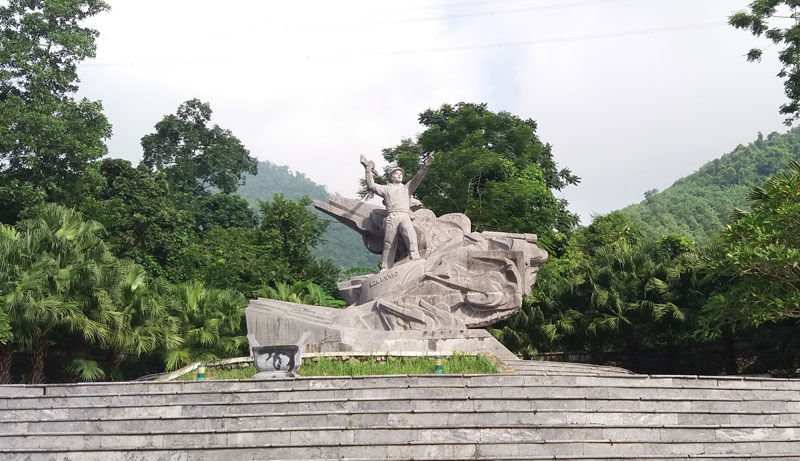
(HBO) – The monument commemorating national hero Cu Chinh Lan has become a historical relic site as part of destinations on the Binh Thanh-Thung Nai route around Hoa Binh Lake.
The monument is located on Tay Tien
street, about 8 kilometers from Hoa Binh city. The site is a highlight of the
green forest of Giang Mo in Binh Thanh commune of Cao Phong district, reminding
the great sacrifice by the hero, who lit up the "Cu Chinh Lan movement” and
"Hero of Road 6” movement during the national safeguarding of the Vietnamese
people and army.
Sixty-six years ago, on May 19, 1952,
martyr Cu Chinh Lan, who was born in Quynh Luu district of Nghe An province,
was one of the seven first people nationwide posthumously bestowed the title of
"Hero of the People’s Armed Forces”.

The monument to hero Cu Chinh Lan in Giang
Mo village, Binh Thanh commune, Cap Phong district, is part of the Hoa Binh
Lake destinations.
In a fierce battle, Cu Chinh Lan, who was
a squad leader, crossed the road, jumped to a tank of the enemy, prized up its
cover door and threw a grenade with a deactivated safety pin into the cabin,
killing a group of enemy troops in the leading tank.
The bravery and creativity of Cu Chinh Lan
become viral in Hoa Binh campaign, inspiring the whole people and army.
In order to commemorate the feat of arms
of hero Cu Chinh Lan as well as the Vietnamese people and army, in 1965, the
culture sector of Ha Son Binh province, which comprised Hoa Binh now, proposed
the recognition of the heroic event.
In 1993, the Ministry of Culture and Information,
which is the Ministry of Culture, Sports and Tourism now, issued a decision to
recognise the Cu Chinh Lan historical relic site as a national relic site.
In 1994, Hoa Binh province started the
construction of the site and a monument dedicated to "the tank-destroying hero”.
In 2008, the ministry and the province agreed
to move the site to Mo I village, Binh Thanh commune, Cao Phong district.
The work was built in a total area of
3,638 square metres, including a statue made of Thanh Hoa stone with a height
of 8.5m and a volume of 160.4 cubic metres.
A primary school and a secondary school in
Cham Mat ward of Hoa Binh city were named after hero Cu Chinh Lan.
With an increasingly vibrant and widespread emulation movement aimed at building cultured residential areas and cultured families, Yen Thuy District has been making steady progress toward improving both the material and spiritual well-being of its people, while fostering a civilized, prosperous, beautiful, and progressive community.
Once lacking recreational spaces and community facilities, Residential Group 2 in Quynh Lam Ward (Hoa Binh City) has recently received attention for the construction of a new, spacious, and fully equipped cultural house. The project followed the model of state support combined with public contributions in both labor and funding.
The "All people unite to build cultural life" movement, which has been effectively integrated with Kim Boi district’s socio-economic development goals, is fostering a lively spirit of emulation across local residential areas, hamlets, villages, public agencies, and enterprises. In addition, through the initiative, traditional cultural values are being preserved and promoted, while community solidarity and mutual support in poverty reduction and economic development are being strengthened.
A working delegation of the Hoa Binh provincial People’s Committee led by its Permanent Vice Chairman Nguyen Van Toan on June 11 inspected the progress of a project to build the Mo Muong Cultural Heritage Conservation Space linked to tourism services in Hop Phong commune, Cao Phong district.
Born and growing in the heroic land of Muong Dong, Dinh Thi Kieu Dung, a resident in Bo town of Kim Boi district, in her childhood was nurtured by the sweet lullabies of her grandmother and mother. These melodies deeply imprinted on her soul, becoming an inseparable part of her love for her ethnic group's culture. For over 20 years, this love for her hometown has driven Dung to research, collect, and pass down the cultural values of the Muong people to future generations.
In the final days of May, the Ethnic Art Troupe of Hoa Binh Province organized performances to serve the people in remote, mountainous, and particularly disadvantaged areas within the province. These were not just ordinary artistic shows, but they were the meaningful journeys aimed at spreading cultural values, enhancing the spiritual life of the people and contributing to the preservation of ethnic minority cultural identities.



